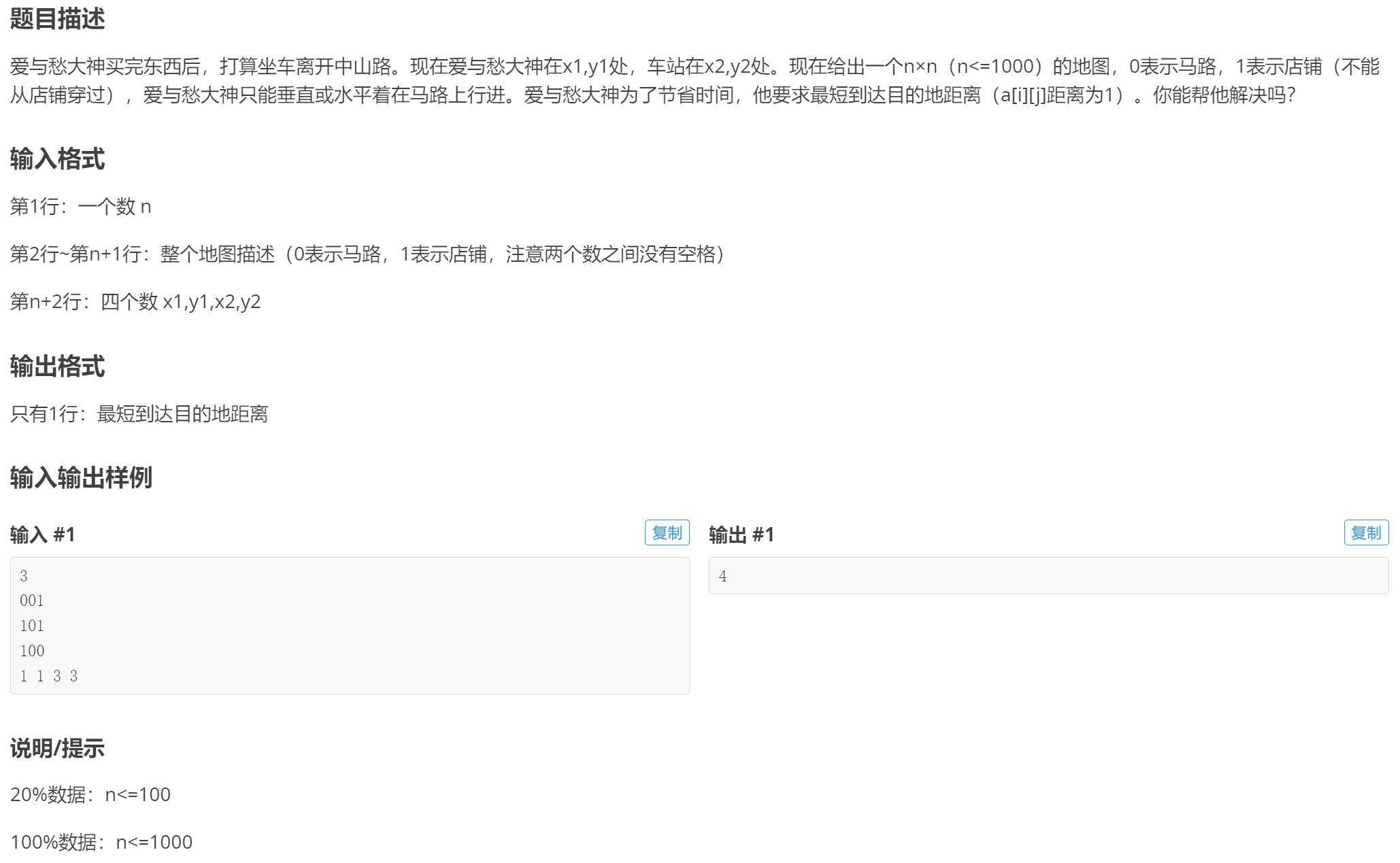离开中山路
 解题思路: 步数的统计可以利用状态转移, 然后就是四向广搜, 出界的和查找过的和店铺不搜
⚠️ c的输入方式跟c++的输入方式不能混用!
解题思路: 步数的统计可以利用状态转移, 然后就是四向广搜, 出界的和查找过的和店铺不搜
⚠️ c的输入方式跟c++的输入方式不能混用!
#include <bits/stdc++.h>
using namespace std;
typedef long long ll;
const int maxn=2000;
int a[maxn][maxn];
ll bs[maxn][maxn];
char aa[maxn][maxn];
int n;
int dire[][2]={-1,0,1,0,0,1,0,-1};
int f[maxn][maxn];
typedef struct{
int x;
int y;
}pos;
pos qi,zhong;
queue <pos> q;
void bfs(){
q.push(qi);
f[qi.x][qi.y]=1;
while(!q.empty()){
pos t=q.front();
for(int i=0;i<4;i++){
pos qt={t.x+dire[i][0],t.y+dire[i][1]};
if(qt.x>=1 && qt.x<=n && qt.y>=1 && qt.y<=n){
if(!a[qt.x][qt.y] && !f[qt.x][qt.y]){
if(qt.x==zhong.x && qt.y==zhong.y){
bs[qt.x][qt.y]=bs[t.x][t.y]+1;
return;
}else{
q.push(qt);
bs[qt.x][qt.y]=bs[t.x][t.y]+1;
f[qt.x][qt.y]=1;
}
}
}
}
q.pop();
// pos t=q.front();
// q.pop();
// if(t.x==zhong.x && t.y==zhong.y) break;
// if(f[t.x][t.y]) continue;//不重复搜索已标记过的坐标
// f[t.x][t.y]=1;
// for(int i=0;i<4;i++)
// {
// int tx=t.x+dire[i][0];
// int ty=t.y+dire[i][1];
// if(tx>0 && tx<=n && ty>0 && ty<=n && !a[tx][ty])
// {
// bs[tx][ty]=min(bs[tx][ty],bs[t.x][t.y]+1);
// pos qq={tx,ty};
// q.push(qq);
// }
// }
}
}
int main(){
// memset(bs,0x7f,sizeof(bs));
cin>>n;
for(int i=1;i<=n;i++){
for(int j=1;j<=n;j++){
cin>>aa[i][j];
a[i][j]=aa[i][j]-'0';
}
}
cin>>qi.x>>qi.y>>zhong.x>>zhong.y;
// bs[qi.x][qi.y]=0;
bfs();
cout<<bs[zhong.x][zhong.y];
return 0;
}还有几个点没搞明白
- 我的做法里min没有意义 “因为你前面已经更新过了”
- 目前我只知道我的做法里, 快的早就转走了,
- 但是实测老师的答案不用min和初始化也能过
还可以做一些调整:
- 比如看老师的答案, 可以有以下改进: 管你什么, 四向都加入队列, 然后在检查点的时候再判断条件, 我原来的答案是先检查条件, 让符合条件的进入队列 (但是超出地图可能需要在加入队列前检查, 不然可能会越界)
#include <bits/stdc++.h>
using namespace std;
typedef long long ll;
const int maxn=2000;
int a[maxn][maxn];
ll bs[maxn][maxn];
char aa[maxn][maxn];
int n;
int dire[][2]={-1,0,1,0,0,1,0,-1};
int f[maxn][maxn];
typedef struct{
int x;
int y;
}pos;
pos qi,zhong;
queue <pos> q;
void bfs(){
q.push(qi);
f[qi.x][qi.y]=1;
while(!q.empty()){
pos t=q.front();
for(int i=0;i<4;i++){
pos qt={t.x+dire[i][0],t.y+dire[i][1]};
if(qt.x>=1 && qt.x<=n && qt.y>=1 && qt.y<=n){
if(!a[qt.x][qt.y] && !f[qt.x][qt.y]){
if(qt.x==zhong.x && qt.y==zhong.y){
bs[qt.x][qt.y]=bs[t.x][t.y]+1;
return;
}else{
q.push(qt);
bs[qt.x][qt.y]=bs[t.x][t.y]+1;
f[qt.x][qt.y]=1;
}
}
}
}
q.pop();
// pos t=q.front();
// q.pop();
// if(t.x==zhong.x && t.y==zhong.y) break;
// if(f[t.x][t.y]) continue;//不重复搜索已标记过的坐标
// f[t.x][t.y]=1;
// for(int i=0;i<4;i++)
// {
// int tx=t.x+dire[i][0];
// int ty=t.y+dire[i][1];
// if(tx>0 && tx<=n && ty>0 && ty<=n && !a[tx][ty])
// {
// bs[tx][ty]=min(bs[tx][ty],bs[t.x][t.y]+1);
// pos qq={tx,ty};
// q.push(qq);
// }
// }
}
}
int main(){
// memset(bs,0x7f,sizeof(bs));
scanf("%d",&n);
for(int i=1;i<=n;i++){
for(int j=1;j<=n;j++){
scanf("%c",&a[i][j]);
a[i][j]=aa[i][j]-'0';
}
getchar();
}
scanf("%d%d%d%d",&qi.x,&qi.y,&zhong.x,&zhong.y);
// bs[qi.x][qi.y]=0;
bfs();
printf("%d",bs[zhong.x][zhong.y]);
return 0;
}